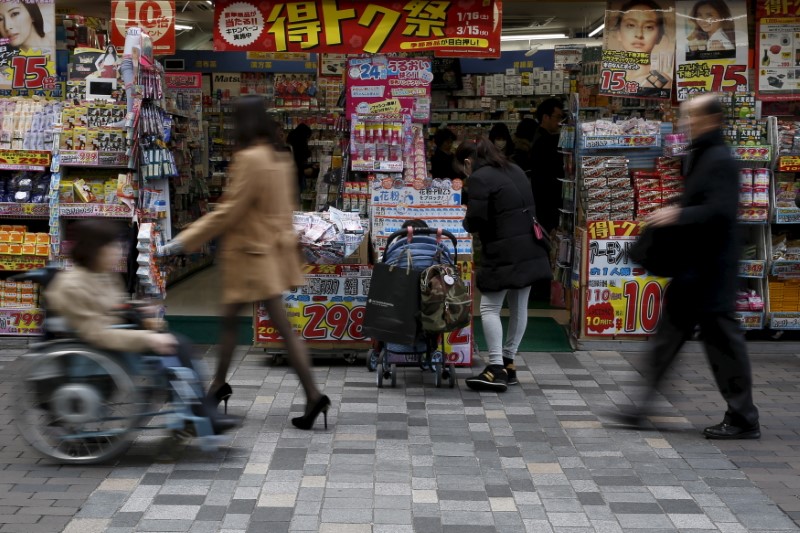 © Reuters. A woman with a baby buggy looks at items outside a discount store at a shopping district in Tokyo
© Reuters. A woman with a baby buggy looks at items outside a discount store at a shopping district in TokyoBy Kaori Kaneko
TOKYO (Reuters) – Japan’s longest run of economic growth since the 1980s asset bubble was expected to stall in the first quarter but is seen likely to regain some momentum over the course of the year, a Reuters poll of economists showed.
The economy was seen growing at an annualized rate of 0.5 percent in the first quarter as consumer spending and factory output weakened, the poll of 39 economists taken April 4-12 found. That’s down from 1.6 percent annualized growth in the fourth quarter.
“Consumer spending and industrial production likely weakened during the period due to such factors as the cold weather and higher vegetable prices,” said Yoshiki Shinke, chief economist at Dai-ichi Life Research Institute. “But the trend of moderate economic recovery has not changed as the overseas economy is solid.”
Japan’s economy, the world’s third largest, has grown for eight straight quarters through end-2017, the longest continuous expansion since the 1980s.
The economists predicted that the economy will expand 1.3 percent over the fiscal year that started in April, down from the expected 1.8 percent for the fiscal year just ended in March.
Despite a solid economy, consumer prices have been slow to recover and inflation remains well below the Bank of Japan’s 2 percent target.
Economists projected the core consumer price index, which includes oil products but excludes fresh food, will rise to 0.9 percent this fiscal year and 1.0 percent for fiscal 2019, excluding the impact on price growth from a scheduled sales tax hike next October.
A strong majority of analysts polled predict the BOJ will again push back the timing of when it expects to reach its inflation target, due partly to the yen’s strength. The Bank currently sees it achieving that goal around fiscal 2019.
Twenty-four of 32 analysts said the BOJ will revise its timing when it releases an outlook for the economy and prices in October, four said revision would be when the bank issues the report in July and two said in April. Two did not offer a view on timing.
“The BOJ will be forced to tweak its policy and the central bank will probably choose to push back the timing to achieve its inflation target rather than adopting additional easing steps,” said Atsushi Takeda, chief economist at Itochu Economic Research Institute.
Prime Minister Shinzo Abe will visit the United States from April 17-18 to meet with President Donald Trump. Japanese officials are bracing for Trump to take an aggressive trade stance.
Asked if the possibility of Japan and the United States starting free trade talks had increased from a year ago, 22 of the 36 economists polled said “increased” or “highly increased”, 13 economists said “no change” and one said “decreased”.
Trump has asked his trade advisers to look at rejoining the Trans Pacific Partnership (TPP), a multinational trade pact he withdrew the United States from last year, White House spokeswoman Lindsay Walters said.
Japanese Finance Minister Taro Aso said on Friday he expected Abe and Trump to discuss the TPP next week.
(Polling by Shaloo Shrivastava and Mumal Rathore; Editing by Malcolm Foster and Eric Meijer)
Fusion Media or anyone involved with Fusion Media will not accept any liability for loss or damage as a result of reliance on the information including data, quotes, charts and buy/sell signals contained within this website. Please be fully informed regarding the risks and costs associated with trading the financial markets, it is one of the riskiest investment forms possible.
Source: Investing.com





























